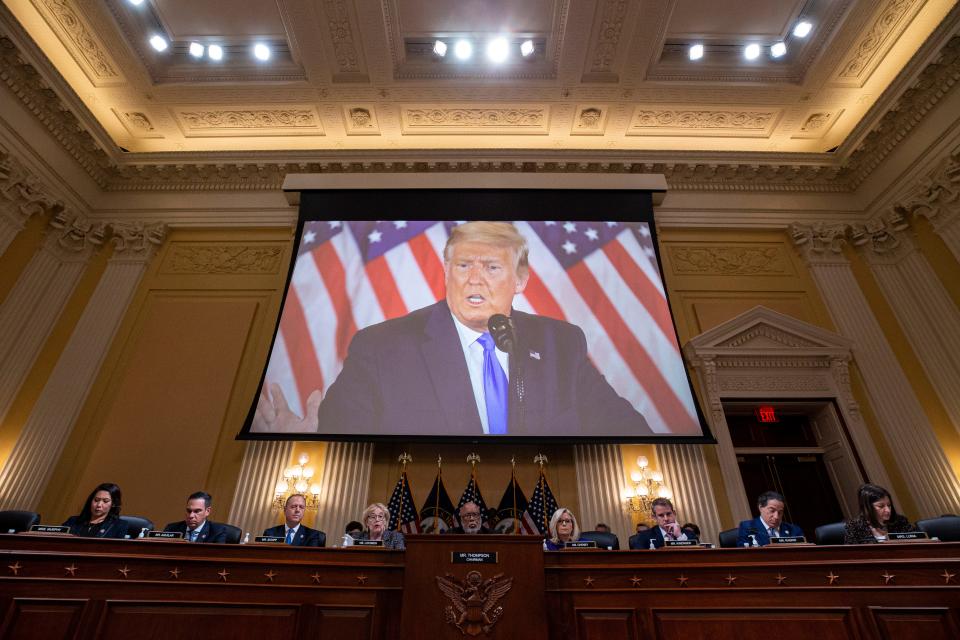Guest column: Fixing cracks in US government should be our resolution for 2023
We have good reason to celebrate our country as we wrap up 2022 and move into the new year.
The long investigation into the Jan. 6 Capitol riot demonstrated clearly that the safeguards built into our system of conducting elections were strong and effective. This process held firm despite the desperate efforts of a defeated president to deny the truth and bully public officials into illegally keeping him in power.

But other news in 2022 revealed lapses in the way our government works. One of those — related to the Capitol riot — was the failure of law enforcement and intelligence agencies to cooperate and act on information they received that a mob was planning to form and disrupt vote ratification activities.
A more serious failure was revealed in Donald Trump’s tax returns as analyzed by the nonpartisan Congressional Committee on Taxation. According to a Washington Post article, Trump’s returns included “business” expenses that appeared to be related to personal hobbies, loans to family members that might have been taxable and “large questionable items” that Trump deducted as business losses.
In spite of these red flags, the committee noted that the IRS didn’t start auditing Trump’s returns until 2019, which wasn’t until members of Congress began making inquiries. It’s unlikely that you or I would be given the benefit of the doubt by the IRS if we tried to get away with similar tactics. But taxpayers like Trump seem to have the agency intimidated by their high-powered accounting firms and tax attorneys.
More:Guest column: We need a new saying about politics — 'Winning is just the beginning'
As I read about this apparent double standard regarding ordinary taxpayers and the rich and famous, I was reminded of a similar situation described in a book by sociologist Arlie Russell Hochschild, "Strangers in their Own Land." Hochschild, a liberal from Berkeley, spent more than five years living in Louisiana in an effort to understand the motivation of the people who voted for Trump in 2016. One thing she found was a deep distrust of government and a pervasive feeling that the rules are different when you don’t have power and influence.
“The state always seems to come down on the little guy,” said one man interviewed by Hochschild. “If your motorboat leaks a little gas into the water, the warden’ll write you up. But if companies leak thousands of gallons of it and kill all the life here? The state lets them go. If you shoot an endangered brown pelican, they’ll put you in jail. But if a company kills the brown pelican by poisoning the fish he eats? They let it go.”
If the IRS and the EPA, two of the nation’s most powerful government agencies are widely perceived to be dancing to the tune of the favored elements of our society, it spells trouble for a democracy expected to be “for the people.” Examples of selective treatment in other areas, like law enforcement and banking, compound the sense of disrespect and mistrust many feel about the government and those who run it. Sad to say, many people believe, “this government doesn’t work for me.”
For reasons I don’t fully understand, Trump — an ostentatious member of the upper class — was somehow able to convince millions of Americans that he understood their frustrations and would work on their behalf. Trump’s popularity appears to be waning because of his actions to stay in power, but the underlying conviction of many Americans that they are misunderstood, scorned and have no effective voice in government remains strong.
In the early 1800s, Andrew Jackson is credited with bringing needed correction to a government that saw itself as an elite class. But Louisiana’s Huey Long and Alabama’s George Wallace also attracted strong support for brief periods and would have moved our country in radical directions. Long advocated isolationism, a guaranteed income, and free medical care and college, among other things. Wallace was for racial segregation.
More:Guest column: Extremists draw more attention, but moderates are worth seeking out
As we move ahead toward the 2024 presidential election, it will be important for all Americans to study the candidates closely and vote for those most willing and able to move our government toward the ideal envisioned by Abraham Lincoln — “of the people, by the people and for the people.” All the people.
William C. Wertz is a writer with an extensive background in journalism and corporate communications. He was chief political correspondent for The Associated Press in Illinois and South Dakota and later became a communications director for Phillips Petroleum Co. in Bartlesville and Walmart Inc., in Bentonville, Arkansas. He and his wife, Marva, live in Oklahoma City.
This article originally appeared on Oklahoman: William Wertz: Let's resolve to fix cracks in US government

